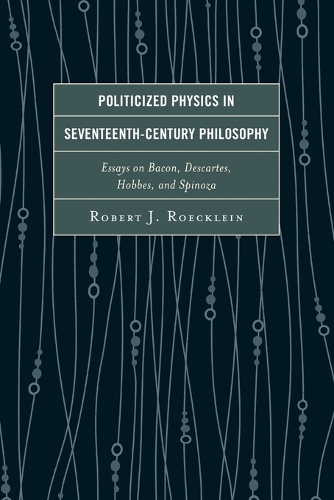
Politicized Physics in Seventeenth-Century Philosophy: Essays on Bacon, Descartes, Hobbes, and Spinoza
(Paperback)
Publishing Details
Politicized Physics in Seventeenth-Century Philosophy: Essays on Bacon, Descartes, Hobbes, and Spinoza
By (Author) Dr. Robert J. Roecklein
Bloomsbury Publishing PLC
Lexington Books
27th March 2017
United States
Classifications
Professional and Scholarly
Non Fiction
Philosophy
Ancient Greek and Roman philosophy
Western philosophy from c 1800
320.01
Physical Properties
Paperback
266
Width 149mm, Height 230mm, Spine 17mm
426g
Description
In the origins of Western philosophical thought, doctrines of physics intertwined with the debate between political philosophers. It is for this reason that Plato devoted his dialogues Theatetus and Parmenides to investigating and meeting the arguments of his principal philosophical adversaries. The doctrine of atomism, which developed under the influence of Parmenides philosophy, is one that Plato refutes directly. In the modern era of philosophy and science, a revived doctrine of atomism has been treated as apolitical. Atomistic postulates lay at the root of the doctrines of Early Modern philosophers and exert a great influence upon cultural and political teachings. In order to understand Early Modern Philosophy, therefore, and especially in order to examine Early Modern political science, one must address the atomistic theory of body which lies at the root of Early Modern metaphysics. In the metaphysical domain, or in the domain of natural philosophy, the Early Modern philosophers radically reduce the role that ordinary opinion may play in political and cultural life. The majestic declarations concerning the rights of man, and the gospel of utility characteristic of the political domain of Early Modernity, therefore conceal a shrunken influence fated for the demos in the new politics. In order to take the measure of the new political science, it is necessary to take the measure of the revived doctrines of atomism. If these doctrines can be disproved, by reviving Platos critique, we will be able to take a critical look at the political doctrines that lie upon the foundations of the politicized atomism.
Author Bio
Robert J. Roecklein teaches rhetoric and political philosophy at Pennsylvania State University, Erie, the Behrend College and the author of Plato Versus Parmenides: The Debate Over Coming-into-Being in Greek Philosophy (Lexington Books, 2010) and Machiavelli and Epicureanism: An Investigation into the Origins of Early Modern Political Thought (Lexington Books, 2012).
